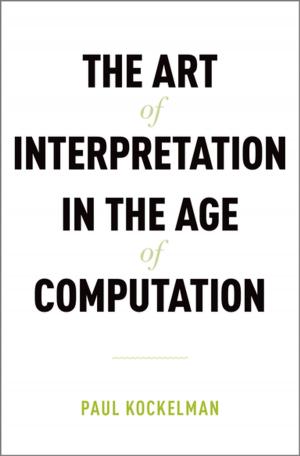Unreliable Witnesses
Religion, Gender, and History in the Greco-Roman Mediterranean
Nonfiction, Religion & Spirituality| Author: | Ross Shepard Kraemer | ISBN: | 9780190453923 |
| Publisher: | Oxford University Press | Publication: | December 27, 2010 |
| Imprint: | Oxford University Press | Language: | English |
| Author: | Ross Shepard Kraemer |
| ISBN: | 9780190453923 |
| Publisher: | Oxford University Press |
| Publication: | December 27, 2010 |
| Imprint: | Oxford University Press |
| Language: | English |
In her latest book, Ross Shepard Kraemer shows how her mind has changed or remained the same since the publication of her ground-breaking study, Her Share of the Blessings: Women's Religions Among Pagans, Jews and Christians in the Greco-Roman World (OUP 1992). Unreliable Witnesses scrutinizes more closely how ancient constructions of gender undergird accounts of women's religious practices in the Greco-Roman Mediterranean. Kraemer analyzes how gender provides the historically obfuscating substructure of diverse texts: Livy's account of the origins of the Roman Bacchanalia; Philo of Alexandria's envisioning of idealized, masculinized women philosophers; rabbinic debates about women studying Torah; Justin Martyr's depiction of an elite Roman matron who adopts chaste Christian philosophical discipline; the similar representation of Paul's fictive disciple, Thecla, in the anonymous Acts of (Paul and) Thecla; Severus of Minorca's depiction of Jewish women as the last hold-outs against Christian pressures to convert, and others. While attentive to arguments that women are largely fictive proxies in elite male contestations over masculinity, authority, and power, Kraemer retains her focus on redescribing and explaining women's religious practices. She argues that - gender-specific or not - religious practices in the ancient Mediterranean routinely encoded and affirmed ideas about gender. As in many cultures, women's devotion to the divine was both acceptable and encouraged, only so long as it conformed to pervasive constructions of femininity as passive, embodied, emotive, insufficiently controlled and subordinated to masculinity. Extending her findings beyond the ancient Mediterranean, Kraemer proposes that, more generally, religion is among the many human social practices that are both gendered and gendering, constructing and inscribing gender on human beings and on human actions and ideas. Her study thus poses significant questions about the relationships between religions and gender in the modern world.
In her latest book, Ross Shepard Kraemer shows how her mind has changed or remained the same since the publication of her ground-breaking study, Her Share of the Blessings: Women's Religions Among Pagans, Jews and Christians in the Greco-Roman World (OUP 1992). Unreliable Witnesses scrutinizes more closely how ancient constructions of gender undergird accounts of women's religious practices in the Greco-Roman Mediterranean. Kraemer analyzes how gender provides the historically obfuscating substructure of diverse texts: Livy's account of the origins of the Roman Bacchanalia; Philo of Alexandria's envisioning of idealized, masculinized women philosophers; rabbinic debates about women studying Torah; Justin Martyr's depiction of an elite Roman matron who adopts chaste Christian philosophical discipline; the similar representation of Paul's fictive disciple, Thecla, in the anonymous Acts of (Paul and) Thecla; Severus of Minorca's depiction of Jewish women as the last hold-outs against Christian pressures to convert, and others. While attentive to arguments that women are largely fictive proxies in elite male contestations over masculinity, authority, and power, Kraemer retains her focus on redescribing and explaining women's religious practices. She argues that - gender-specific or not - religious practices in the ancient Mediterranean routinely encoded and affirmed ideas about gender. As in many cultures, women's devotion to the divine was both acceptable and encouraged, only so long as it conformed to pervasive constructions of femininity as passive, embodied, emotive, insufficiently controlled and subordinated to masculinity. Extending her findings beyond the ancient Mediterranean, Kraemer proposes that, more generally, religion is among the many human social practices that are both gendered and gendering, constructing and inscribing gender on human beings and on human actions and ideas. Her study thus poses significant questions about the relationships between religions and gender in the modern world.















